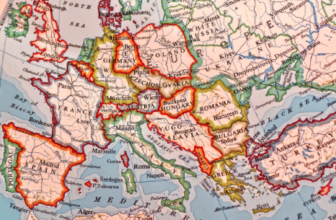
If you’re like us, you use the internet every day. You check Google for unknown information. You research GIFs for the perfect comeback on Facebook. You find clever memes to make your loved ones cry with laughter.
But how does the internet work? If someone asked you to explain the internet in thirty seconds, would you spend the first ten thinking, “Whoa, how does the internet work?”
After those ten seconds, would you realize you know nothing and make something up? Or would you shrug your shoulders like, “beats me?”
Whatever the case, we’re here to answer that question.
How Does the Internet Work?
Most of us know how to use the internet without knowing how it works. Similar to your car, you drive it every day, but if you broke down in the middle of nowhere, all you would know how to do is “call a guy.”
If this is you, relax, we’re here to clear all that up. If you’ve ever asked yourself how does the internet get accessed or how does data transmit online, we’ve got you.
So, how does the web work?
Think of a Wire
Most people tend to think of a cloud when they think of the internet. It’s the place where everything gets stored.
The internet is simply a wire. The internet is useful because two people connected to this wire can communicate. They can send emails, funny memes, receipts of love, or angry letters of envy.
When two people are connected to this wire, through servers, they are able to communicate.
How Do Servers Work?
A server is a special computer connected directly to the internet. Web pages are files on that server’s hard drive.
Every server has a unique internet protocol address or IP address. Think of it like a postal address for the internet. IP addresses help computers find each other (like long lost lovers).
However 700.301.58.981 doesn’t quite roll off the tongue, so we give them names like Google, Amazon, or YouTube. Get it?
This Is How it Works
You may be thinking your computer at home is a server, it’s not. Let me say that again: your home computer is NOT a server. Why? Because it’s not directly connected to the internet.
Computers we use at home are called clients because they indirectly connected to the internet through an Internet Service Provider (ISP).
Our ISP acts as a third party on our behalf to connect us with the server we would like to connect with, say Google.com.
A Scenario of Epic Proportions
Let’s say we want to know why monkeys are able to communicate using sign language. We’ve always wondered about that.
Here is the scenario the internet takes to find the answer to our random question:
- We hop onto our laptop that connects to our internet service provider.
- Let’s say we use Verizon Fios.
- We type in google.com “How are monkey’s able to communicate using sign language.”
- My ISP (AKA Verizon Fios) connects with Google’s IP address and asks the question.
- Google checks servers from all across the internet.
- It finds files (AKA websites) on that particular topic.
- Google sends those files from many different servers back to me.
- Google displays them as a list for me to view.
Simple right? Did you ever think all of that was happening simultaneously while you press enter? It’s fascinating.
A Scenario on a Smaller Scale
Now, let’s say my Aunt Ruth has a burr in her heel and can’t get around so well. We are super close, and I worry about her busted heel from time to time.
We don’t want to make her rush for the phone and hurt said heel, so we send an email (she likes those). Emails are like the new electronic love note, right?
She uses yahoo. Yahoo? Yeah, she’s a bit old.
We use Gmail because we’re with the times. How would that scenario play out?
- We log into the internet through our Verizon Fios.
- We connect to Gmail. We right out a little letter and send it on its merry way.
- Gmail connects with Yahoo’s IP address and sends the email to Aunt Ruth
- Aunt Ruth gets the email and feels loved and valued.
- She sends back Tommy Boy GIF that reads “Holy Schnikeys” and adds you sent me an email! (She knows I’m a big Tommy Boy Fan).
- The process reverses, and I laugh.
But What’s Really Happening Though?
We’re glad you asked. Think, Willy Wonka’s Chocolate Factory? In it, a boy who loves television so much decides to become digitized.
His picture is turned into tiny dots that move over to the television and then are reassembled to the screen. Then the Umpah-Loompahs play.
That’s similar to the internet. Whenever an image, email, or webpage travels across the internet, they are broken up into what is known as “packets” and then reassembled in the correct order when they reach their destination.
Okay, But Why Don’t Packets Get Confused with Other People Close to You in Proximity?
Let’s say you’re at work and scrolling on Facebook (not allowed). Your boss is in the next room and is returning emails. Why doesn’t your boss see any of the things you are doing?
We’re glad you asked. That has to do with IP addresses and routers. Everything connected directly or indirectly to the internet has an IP address. That includes computers, servers, cell phones, and everything else.
Anywhere where two or more parts of the internet intersect there is a router in between. Routers direct your packets around the internet. It helps each packet get one step closer to its destination.
Imagine your content like a package wrapped with many layers. Every time you send something through the internet, there may be ten to fifteen routers helping your content get there.
Each time it passes through a router, a new wrapper, or IP address is added, and so on until it reaches the correct server. As it returns, the packages are unwrapped until it gets back to you.
Pretty cool, huh? This is actually the beginning of the new internet, known as the blockchain.
The New Internet: Why You Need to Know Blockchain
Thanks to advancements in technology, a new form of the internet is starting to take shape that will change everything.
This type of internet will change everything from money to sending information, to buying and selling, you name it, it’s changing. That’s why now is the right time to receive blockchain education.
Become one of the first to understand this game-changing transformation of the internet. It’s already here, so you might as well learn. You’ll be glad you did.
The Internet, Only Better
We know what you’re thinking. Just when you were wondering how does the internet work, it goes and changes on you. We get it! That’s life. Am I right?
If you’re looking for new ways to understand how to make money online, marketing, or how to build a blog that can make you rich, check out the rest of our site.





